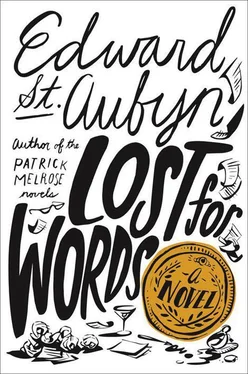They were all sticks in the whirlpool of Poppy’s ferocious will, the weaker she became physically, the stronger her psychological pull. A principled hunger strike, like Gandhi’s, which was aimed at achieving something in the outside world, looked very impure and compromised compared to a hunger strike whose sole object was to stop eating: this was the white on white of the hunger strike, the moment when it became abstract and transcended the clumsy literalness of merely representing one thing or another.
She felt a violent desire to tear the bird feeder off its branch, and then she realized she was thinking of King Lear after Cordelia’s death. Why should a bird have life when Poppy …
And then she found herself wondering why any book should win this fucking prize she had become involved with unless it had a chance of doing what had just happened: coming back to a person when she wanted to cry but couldn’t, or wanted to think but couldn’t think clearly, or wanted to laugh but saw no reason to.
‘The rank sweat of an enseamed bed’, thought Katherine, sensing the dampness of the sheets as she reached for the clock on the bedside table. It had been flattened by Didier when he knocked over the lamp and sent it to the floor with a muffled clatter that echoed her own scattered climax better than the groans of ecstasy, whimpers of disbelief, and an incongruous gasp of ‘ Oh, la vache! ’ emanating from the orgasmic Theorist.
It was eleven thirty-four on the morning of another formless day, without professional obligations, or medical appointments, or even social engagements, becalmed in a vast Pacific of self-employment. Didier was next door, oppressing her with his riotous creativity, tossing off another chapter on some neglected paradox, or hidden ‘scandal’ of semiotics. She could hear the pensive mumblings and triumphant yelps that accompanied his energetic style of writing and she found them, in their way, even more annoying than his cries of sexual pleasure.
Katherine was suffering from a familiar seducer’s gloom. Just as a ‘good shot’ might kill two hundred partridges over a weekend without being expected to eat them all for dinner on Sunday night, a woman with Katherine’s genius for engendering desire and devotion couldn’t be expected to deal with all of its consequences. She lived for the moment of submission, and although it lasted a little longer than the moment when a bird jerks its head backwards and starts to plummet through the air, she sometimes wished that Yuri and Alan and Sam and Didier, and all the others, could be lined up on the ground at the end of the year and become, like Don Giovanni’s conquests, purely numerical. Mille e tre! Mille e tre! Mille e tre!
Where was her staying power? Where was the patience that might turn her gift for sudden intimacy into lasting love? She felt a spasm of loneliness, but not of the kind that could be cured by running to Didier; the only cure was to run away from him into the shallows of a new affair. She was reminded of the beach her family used to go to in Devon when she was a child, sloping gently into the sea and then, under the swell of the milky brown water, suddenly dropping away. She used to panic when she had been swimming too long, needing each wave to take her back to the slope, where her stretched foot could feel the gritty sand against her skin.
When she was fourteen she had watched her father die of a bee sting nobody knew he was allergic to. His face swelling and his throat swelling, while she sat with him beside the pool of their rented holiday house in Spain, his windpipe closing and letting in less and less air, while her mother, who never fully understood, because she didn’t have to watch it happening, rushed off to the local pharmacy and came back too late.
A thousand hours of psychotherapy had done their familiar work, making an intellectually obvious truth into a deeply felt one. She knew that her anxiety about being abandoned made her compulsively abandon anyone who got close to her. Her father’s death had ensured that she would never put herself in a position to receive another blow of that sort — or get out of the position of expecting one. What the psychotherapy had to wait for life to provide was this moment of ripeness and crisis. Nothing so stubborn could change until it became more painful to avoid than to confront. That crisis had come, but she still had no idea what action to take.
There was a professional (but certainly not romantic) option in the form of John Elton, the American literary agent, who had left a message inviting her to lunch.
She had first met John Elton in his New York agency at the beginning of her career. When she was shown into his office, his black brogues were resting on the edge of his desk, while he tilted back in a swivel chair, talking on the phone. With a flick of his hand, and the slightest nod, he indicated that she should sit down in the small armchair on the other side of his desk.
‘Robert Mapplethorpe’s work is the Parthenon of sado-masochistic homosexuality,’ he said down the phone.
There was a pause. He looked over at Katherine incredulously; inviting her to marvel at the stupidity of the protests she could not hear.
‘I could find you ten thousand sadists this afternoon,’ he replied.
Further scepticism must have been expressed on the other end of the phone.
‘Uptown or downtown?’ said John, with a peal of knowing laughter.
While the conversation unfolded, Katherine found herself fascinated by Elton’s disastrous hair transplant. She had been told about this radical new procedure but had never witnessed its results. The skin around the last fertile follicles had been cut from the back of his neck and sewn on to the hairless dome of his head. The raw red patches of stitched skin formed little islands of dying hair in a shining ocean of baldness.
John hung up the phone, with a contemptuous smirk.
‘They buy a million-dollar book and they don’t even know how to market it,’ he said.
‘Fools,’ said Katherine, smiling.
‘Do you have something for me?’
‘I have the first half of my second novel,’ said Katherine bashfully, taking a manila envelope from her plastic duty free bag.
‘I loved Hanging On Every Word ,’ said John, and then bewitched her with his detailed knowledge of her first book.
Nothing had come of that New York meeting. She had waited a fortnight for his response to her typescript, and although he had told her that it was ‘superb material’, intoxicating her for a whole day, he had not, in the end, found a publisher who would commit to it in advance. They had drifted apart, as people do when they promise to stay in touch; the ones who are going to stay in touch don’t need to promise. She knew that he was back in touch with her now because the stench of disappointment surrounding the Elysian debacle had reached his sensitive olfactory system. Her own agent, Angela, was completely blameless in the matter and Katherine had no intention of getting rid of her. In fact, Angela had written a fierce letter to the committee requesting that they take Consequences into consideration and explaining Page and Turner’s mistake, but she had received a firm refusal from David Hampshire, saying that ‘a deadline is a deadline’, and that he was not going to ‘open the floodgates to special pleading’. Given that she wasn’t going to change agents, Katherine felt a certain apathy about taking up John’s offer of lunch.
Besides, there had already been enough bloodletting, with the sacking of Alan’s assistant and then of Alan himself. She had almost written to him, but had managed to refrain. When she first cut a lover out of her life, she liked to do it thoroughly. Nevertheless, she felt something other than pure relief when Alan stopped writing to her, especially when Sam stopped at about the same time. And then, last night, after almost three weeks of silence she had received an email, not just from Sam but also about Alan and the shocking state he had been in when Sam ran into him in a shop in Pimlico. She hadn’t answered him and she wasn’t going to, at least not yet. The priority was to get rid of Didier, not to take back Sam or Alan.
Читать дальше












